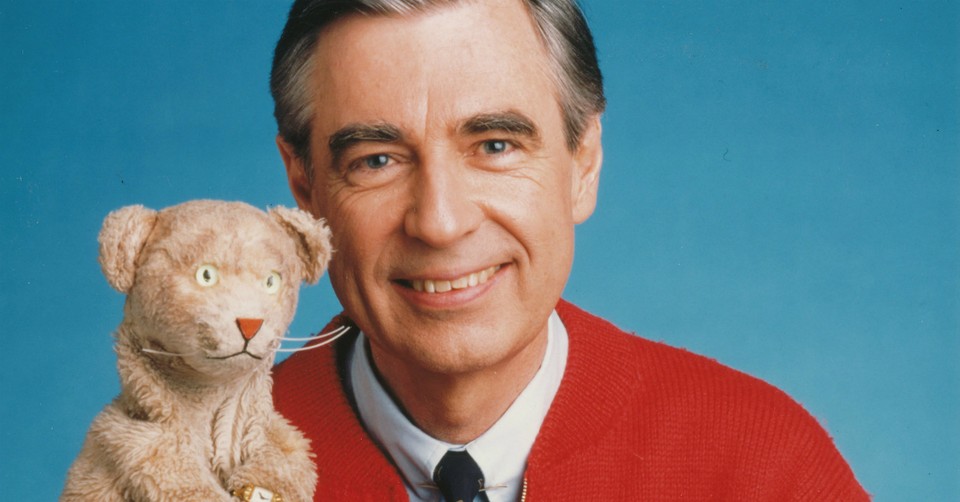5 Remarkable Ways Mr. Rogers Exemplified Love and Integrity

In an era when the Power Rangers, Ninja Turtles, X-Men, and Animaniacs dominated children’s television, I’m still amazed that I chose to watch Mr. Rogers’ Neighborhood as much as I did growing up, and I wasn’t alone.
By all television standards, Mr. Rogers’ Neighborhood wasn’t flashy. It wasn’t laugh-out-loud funny. It was a low-budget PBS children’s program broadcast from station WQED in Pittsburgh.
There were no space battles, sword fights, or buckets of slime.
The main character didn’t have any superpowers or fight crime.
Just a gentle, old man in a cardigan sweater, who sang songs, played with puppets, and talked about things like kindness, feelings, and how to navigate the difficult parts of life.
And I loved it!
Loved, Cared for, and Understood
Like many children, I cherished my trips to Mr. Rogers’ Neighborhood and grew up feeling loved, cared for, and understood by the show’s soft-spoken host, a man known by millions around the world only as Mr. Rogers.
A humble Presbyterian minister, Fred Rogers believed that children deserved more from television and cared enough to do what no one was willing to do on camera at the time. With every life encounter and episode of his show, Fred Rogers spoke directly to the hearts of children by focusing on the intrinsic value of every child.
He was intentional, caring, honest, and deeply in touch with his own feelings. And though he dedicated his life to caring for the youngest amongst us, his message of kindness extended far beyond his target audience.
To this day, Mr. Rogers ministers to the child in all of us by speaking to the feelings we all have and our eternal desire to be loved and accepted just as we are.
In the words of John Maxwell, “a leader is one who knows the way, goes the way, and shows the way.” When it comes to kindness, gentleness, and living with purpose, if anyone led by example, it was Mr. Rogers.
But how did he do it?
This is the question explored in Marielle Heller’s newest feature, A Beautiful Day in the Neighborhood, starring Tom Hanks as everyone’s favorite neighbor. While Mr. Rogers certainly didn’t have a monopoly on kindness, he was remarkably effective at it, and connected with audiences in a very unique way.
So what can we learn from his example, both on and off the screen?
1. Consistency Matters
People have often wondered who Fred Rogers was when he wasn’t Mr. Rogers. Those who knew him have told us. The same love and kindness we saw in Mr. Rogers’s television neighborhood, Fred Rogers modeled in his life. He wasn’t playing a character. He wasn’t putting on a show just for the cameras.
He was authentically and consistently himself both on screen and off. To a child, that kind of love and kindness cannot be faked.
From the way he opened each episode to the songs he wrote and sang on the show, every word was intentional and every action purposeful. Everything was designed to make children feel safe, valued, cared for, and invited.
Mr. Rogers said in a 1969 congressional hearing that, “one of the first things a child learns in a healthy family is trust.” Children knew what to expect from Mr. Rogers and trusted him because he was consistent with his words, his tone, and his interactions with others. In any relationship, consistency in character creates trust, and when we trust someone, we’re more inclined to listen to what they are saying and believe it.
2. If Feelings are Mentionable, They’re Manageable
Mr. Rogers’ Neighborhood never shied away from heavy topics. I mean, how many television shows are brave enough to tackle topics like death, divorce, loneliness, racism, assassination, and self-worth, especially for kids? Mr. Rogers’ Neighborhood did, and Mr. Rogers always approached these conversations with honesty, vulnerability, and empathy.
More than anyone on television, Fred Rogers remembered what it was like to be a child and knew what it felt like to not be allowed to show your emotions or express your feelings.
He always believed, however, that a child’s feelings are just as important as those of adults. He communicated that children should never have to feel isolated or try to make sense of their emotions on their own. No one should. Sometimes honesty, compassion, and conversation are the first steps to understanding and managing the feelings we all have.
Using puppets, a world of make-believe, and direct conversations with his audience, Mr. Rogers was willing to talk about the feelings we are sometimes too afraid to share. In doing so, he helped children “navigate the difficult modulations of life” and proved that, even though we may look and sound different on the outside, what we feel on the inside is often very similar.
Fred Rogers reminded us consistently that we’re all neighbors in the neighborhood of life. And, that sometimes we just need to hear other peoples’ stories and listen to our neighbors to understand that we’re in this together.
3. Silence is Golden
Mr. Rogers might be one of the greatest communicators in history, but he often said very little. With his quiet voice and gentle demeanor, he demonstrated that stillness and silence are often more powerful than words.
In a time when children’s television was speeding up, Mr. Rogers knew how to slow things down. He was never rushed. He talked slowly, chose his words carefully, and asked direct questions. There was a quiet strength to his gentleness and humility, and on Mr. Rogers’ Neighborhood, even though there was slow space, there was never wasted space.
Sometimes, Mr. Rogers wouldn’t say anything at all. His silence, however, invited others to speak. The man knew how to listen. And when he listened, he made others feel valued, heard, and understood. Shouldn’t that be the goal in every conversation and relationship?
Mr. Rogers said that, “I think silence is one of the greatest gifts we have.” If that’s true, Mr. Rogers had a lot to give.
4. Children are Precious Just the Way They Are
Since the show ended in 2001, a fair amount of criticism has been thrown at Mr. Rogers for reinforcing the idea that children are “special.” Many believe that this was the kind of thinking that contributed to the entitlement and narcissism found in many of today’s youth.
And yet, there is a difference between knowing your inherent worth as a child of God and thinking you are somehow better than others, isn’t there?
Mr. Rogers didn’t encourage entitlement or self-obsession in children. He believed that all children should be valued for who they are, not who they will become. Their worth isn’t based on things they’ve done, how they look, or how talented they are. “It’s you I like,” he sang, “every part of you. Your skin, your eyes, your feelings. Whether old or new.”
To him, children (and adults) had value simply for being alive, and at the end of every show, he reinforced this idea by singing, “it’s such a good feeling to know you’re alive, it’s such a happy feeling you’re growing inside.”
Without saying it outright, Mr. Rogers affirmed that all children are “fearfully and wonderfully made” and precious in the eyes of God. “Love is at the root of everything,” he said, “all learning. All parenting. All relationships. Love or the lack of it. And what we see or hear on the screen is part of who we become.”
Furthermore, Mr. Rogers believed that people can’t grow unless they are loved and accepted exactly the way they are. When someone knows and believes that they are beautiful, valued, seen, and loved from the inside out, they will be filled with confidence and a sense of purpose.
Fred made sure that every child felt this way in his presence, whether face-to-face or from the other side of the television screen.

5. Fame is a Four-Letter Word
Mr. Rogers might be one of the most beloved figures in television history, but he had something to say about the word “fame.” To Mr. Rogers, fame was just a four-letter word. It’s what you do with it that counts. He might say the same thing about the way we use our words and how we choose to live our lives as well.
“How will man use his miracles?” President Lyndon B. Johnson asked, “the answer begins with public television, and our goal is to enrich man’s spirit.” Mr. Rogers did plenty of that in his life and took full advantage of the time and opportunities he was given.
As an ordained minister, Fred Rogers chose to go where he knew he would have the greatest impact: television. He preached without ever using the word “God” and ministered to children around the world from the other side of a television screen.
His theology was simple. He loved others, loved himself, and loved children with all the passion and purpose of their creator.
Towards the end of the twentieth century, Fred challenged the world by saying, “let’s take the gauntlet and make goodness attractive in this next millennium.” Well the world is listening, Mr. Rogers, and your ministry and mission of kindness have not been forgotten.
Mr. Rogers taught us to start with love, be kind always, be honest about our feelings, listen more, and make the most of the life we’ve been given.
Sometimes the most effective ministers aren’t the ones preaching from a pulpit, just as the real heroes of our world aren’t the ones wearing capes. Sometimes they wear sweaters, sing songs, and play with puppets. And our world is a much better and brighter place because of them.
Sources
Heller, Marielle, dir. A Beautiful Day in the Neighborhood. United States: TriStar Pictures, 2019. 109 min.
Mr. Rogers’ Neighborhood: The Complete Series. 1968-2001; Pittsburgh, PA. Public Broadcasting Service.
Neville, Morgan, dir. Won’t You Be My Neighbor. United States: Focus Features, 2018. 94 min.
Photo Credit: ©PBS Press Room/Flickr

Originally published December 16, 2019.




